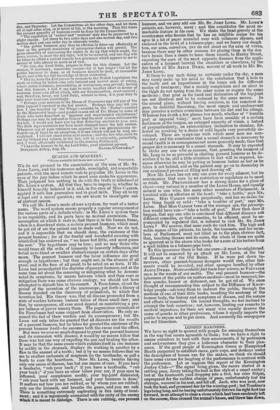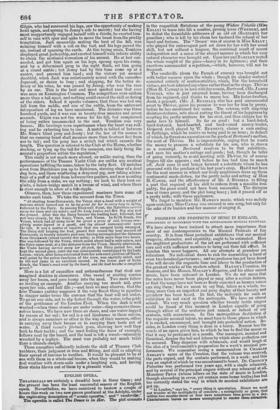LONDON MARINERS.
WE have no right to quarrel with people for amusing themselves in the way that seems agreeable to them; but we have a right to amuse ourselves in turn with their amusements, if by pretension and awkwardness they give a ludicrous character to their plea- sures. If the good people of Kennington Green or Hampstead Heath purported to establish races, gave cups, and donkeys under the description of horses ran for the stakes, we think we should have some excuse for laughing at the performance in contrast with the pretension. Let us suppose this report of the Kennington Jockey Club—" The signal being given, the racers started at a rattling pace, Jenny taking the lead m fine style at a smart canter; but at the fourteenth yard dropping into a trot, her rider Gilpin unprepared for the sudden change of pace, unfortunately lost 14 stirrups, wavered in his seat, and fell off. Jack, who was next, now took the lead, and promised fair for the winning-post; but Tomkins's legs being long, and he having unfortunately thrown his right foot too torward, in an attempt to clear a stone which had been carelessly left on the course, thus crossed the animal's knees, and threw him down. Gilpin, who had recovered his legs, saw the opportunity of making head again, and sprung to Jenny's side to mount-; but she having most inopportunely engaged herself with a thistle, he exerted him- self in vain with spur and spike to move the beast from the prickly temptation. Jack meanwhile making the best of the fall, was solacing himself with a roll on the turf, and his legs pawed the air, instead of spurning the earth. At this trying crisis, Tomkins displayed great jockeyship, and exerted himself with infinite ability to check the mistimed recreation of his animal. He at last suc- ceeded, and got him again on his legs, sprung upon his rump, and by a determined prog in the right flank, set him going at a round amble ; but Jenny had by this time come up at a canter, and pressed him hard ; and the victory yet seemed doubtful, when Jack was unfortunately seized with the cacoethes loquendi, or desire to bray ; and stopping, for the better de- livery of his voice, he was passed by Jenny, who won the race by an ear. This is the best and most spirited race that ever was seen on Kennington Common. The competitors were seldom more than a tail apart, and nothing could exceed the skill or daring of the riders. Indeed it speaks volumes, that there was but one fall from the saddle, and one of the cattle, from the untoward interposition of leg we have mentioned. The distance was three hundred yards, and it was run in twenty-four minutes and seven seconds. Gilpin was not the worse for his fall, but complained of being- rather incommoded in the seat. Tomkins was very hoarse. His bawlings were superhuman when the beast was roll- ing and he exhorting him to rise. A match is talked of between Mr. Sims's blind pony and Jenny ; but the law of the course is that no running beast shall measure more than fourteen feet from ear to tail ; and the pony has a switch tail which exceeds the length. The question is referred to the Club at the Horns, whether docking, or tying up the tail for the occasion, can fairly bring the animal's proportion within the regulation." This really is not much more absurd, or unlike racing, than the performances of the Thames Yacht Club are unlike any nautical operations befitting the name, taken by the baby fleet. Of matches even from Blackfriars yea up to Battersea, steering clear of a dead dog here, and there weathering a dropsical pig, now taking advan- tage of a puff of wind from between two poplars, and now avoiding; the eddy from a stake, we say nothing; we look to their best ex- Volts, a below-bridge match in a breeze of wind, and where there RS river enough to allow of a tide-ripple. Observe, then, how these experienced mariners have come off under such trials. We take the account from the Times.
"At starting from Greenwich, the Venus shot a-head with a weight of canvass which turned out to be too great for her to carry long in safety, followed by the Fairy. In passing Blackwell Point, the Matchless carried away her boom and ran ashore, and the Lady Louisa and Rob Roy also took the ground. After this the Daisy became the leading boat, followed, but not very closely, by the Fairy, Vixen, and Venus. In Erith Reach, the Venus, which had all along borne too great a press of sail, became com- pletely water-logged in a squall, and lay almost unmanageable upon the tide. It was a matter of surprise that she escaped being swamped. The Daisy still keeping the lead, passed first round the boat moored off Gravesend, at twenty minutes past one, having accomplished the distance -from Greenwich (about twenty-five miles) in little more than two hours. She was followed by the Vixen, which sailed about half-a-mile astern, and the Fairy came next, at a like distance from the Vixen. Shortly afterwards, the Vixen having carried away her jib-jack, the Fairy passed her, and kept the second place, until she was subsequently outstripped by the Lady Louisa; which, after being extricated from her awkward position off Black- wall -point by the active exertions of the crew, was capitally sailed, and in the end came in an excellent second. In the lower part of Erith Reach, the Vixen's mast went by the board, and the boat became a complete wreck:, Here is a list of casualties and awkwardnesses that rival our imagined donkies in clumsiness. One vessel at starting carries away her boom, and goes bump into the mud. Two more follow so inviting an example. Another carrying too much sail, goes upon her side, and half fills ;—and here we may observe, that the true Thames yachter supposes it the very finest thing in aquatics to stagger under twice the canvass that the boat will sail under. To go on one side, not to slip fastest through the water, is the pride of the gentlemen of the London Fleet. When the deck is well washed—when three streaks are under water—they conceive them- selves heroes. We have now three on shore, and one water-logged by reason of her sail ; for sail is a sad hindrance to these sailors, and is always somehow or other in the Way of their success, either in carrying away their booms or in carrying their keels out of water. A. third vessel's jib-tack goes, showing how well they look to their tackle ; and the mast feeling the force of example, follows next by the board, and the boat is left a wreck—miserably wrecked by a zephyr. The mast was probably not much taller than a church-steeple. These casualties sufficiently indicate the skill of Thames Club yachters, their judgment in trim and fitting, and skill in adapting their spread of canvass to weather. It would be pleasant to be at sea with them in a whole-sail breeze, when they would be making foul weather with storm-sails under a laughing sun, and having their sticks blown out of them by a pleasant wind.



























 Previous page
Previous page